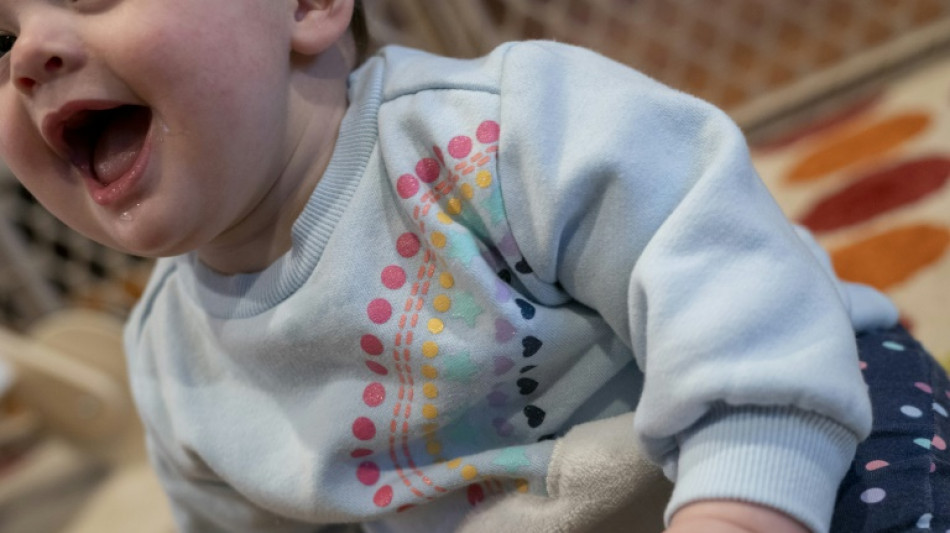
-
 Snowstorm blankets US northeast as New York sees travel ban
Snowstorm blankets US northeast as New York sees travel ban
-
Healthcare crisis looms over Greenland's isolated villages

-
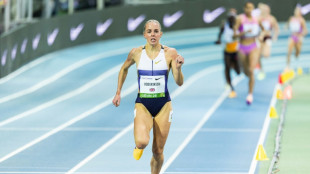 Hodgkinson says breaking 800m record would put her among athletics' greatest
Hodgkinson says breaking 800m record would put her among athletics' greatest
-
Two Russian security personnel were on board France-seized tanker: sources

-
 EU puts US trade deal on ice after Supreme Court ruling
EU puts US trade deal on ice after Supreme Court ruling
-
Hetmyer blasts 85 as West Indies pile up 254-6 against Zimbabwe

-
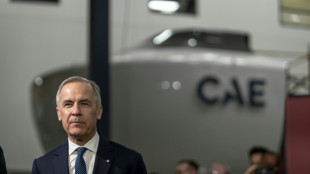 Canada PM heads to Asia seeking new trade partners as US ties fray
Canada PM heads to Asia seeking new trade partners as US ties fray
-
South Africa accepts Trump's new US ambassador

-
 Iraq's Maliki defends PM candidacy, seeks to reassure US
Iraq's Maliki defends PM candidacy, seeks to reassure US
-
UEFA suspend Benfica's Prestianni after alleged racist abuse
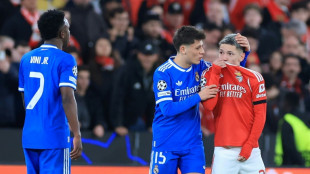
-
 Jetten sworn in as youngest-ever Dutch PM
Jetten sworn in as youngest-ever Dutch PM
-
Italy's Enel to invest 20bn euros in renewables by 2028

-
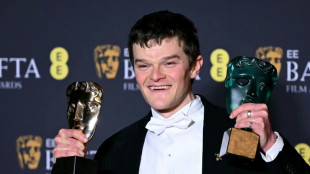 BBC apologises for 'involuntary' Tourette's racial slur during BAFTA awards
BBC apologises for 'involuntary' Tourette's racial slur during BAFTA awards
-
Kristen Bell returns to host glitzy Actor Awards in Hollywood

-
 Iran says would respond 'ferociously' to any US attack
Iran says would respond 'ferociously' to any US attack
-
Venezuelan foreign minister demands 'immediate release' of Maduro

-
 Dane Vingegaard to start season at Paris-Nice in March
Dane Vingegaard to start season at Paris-Nice in March
-
Australia PM backs removing UK's Andrew from line of succession

-
 Where do Ukraine and Russia stand after four years of war?
Where do Ukraine and Russia stand after four years of war?
-
Police investigating racist abuse of Premier League quartet
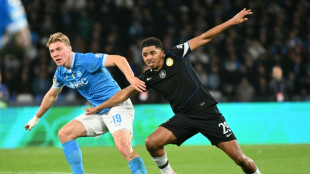
-
 Fiji to start Nations Championship at 'home' to Wales in Cardiff
Fiji to start Nations Championship at 'home' to Wales in Cardiff
-
EU lawmakers to put US trade deal on hold after Supreme Court ruling

-
 Rubio to attend Caribbean summit as US presses Venezuela, Cuba
Rubio to attend Caribbean summit as US presses Venezuela, Cuba
-
'Ugly' England aim to spin their way to T20 World Cup semi-finals

-
 Nigeria paid Boko Haram ransom for kidnapped pupils: intel sources
Nigeria paid Boko Haram ransom for kidnapped pupils: intel sources
-
Tudor says Tottenham can still beat the drop despite Arsenal loss

-
 Violence sweeps Mexico after most-wanted drug cartel leader killed
Violence sweeps Mexico after most-wanted drug cartel leader killed
-
France giant Meafou capable of being 'world's best' lock

-
 Stocks diverge, dollar down over Trump tariffs uncertainty
Stocks diverge, dollar down over Trump tariffs uncertainty
-
World champions South Africa announce eight home Tests for 2026/27

-
 Liverpool boss Slot encouraged by Mac Allister's return to form
Liverpool boss Slot encouraged by Mac Allister's return to form
-
India replaces British architect statue with independence hero

-
 Pakistan warn England's flaky batting to expect a trial by spin
Pakistan warn England's flaky batting to expect a trial by spin
-
Philippines' Duterte authorised murders, ICC told as hearings open

-
 Iran says would respond 'ferociously' to any US attack, even limited strikes
Iran says would respond 'ferociously' to any US attack, even limited strikes
-
New Dutch government sworn in under centrist Jetten

-
 What the future holds for the CJNG cartel after leader killed
What the future holds for the CJNG cartel after leader killed
-
ICC kicks off pre-trial hearing over Philippines' Duterte

-
 UN chief decries global rise of 'rule of force'
UN chief decries global rise of 'rule of force'
-
Nemesio Oseguera, the brutal Mexican drug lord known as 'El Mencho'

-
 Senegal's Sahad, radiant champion of 'musical pan-Africanism'
Senegal's Sahad, radiant champion of 'musical pan-Africanism'
-
New York orders citywide travel ban as major storm hits US

-
 'Considered a traitor': Life of an anti-war Ukrainian in Russia
'Considered a traitor': Life of an anti-war Ukrainian in Russia
-
South Korea and Brazil sign deals on K-beauty, trade

-
 Zimbabwe farmers seek US help over long-promised payouts
Zimbabwe farmers seek US help over long-promised payouts
-
Hong Kong appeals court upholds jailing of 12 democracy campaigners

-
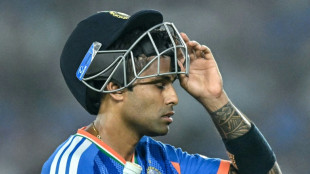 India battle for World Cup survival after 'messing up on grand scale'
India battle for World Cup survival after 'messing up on grand scale'
-
'I will go': Bengalis in Pakistan hope for family reunions
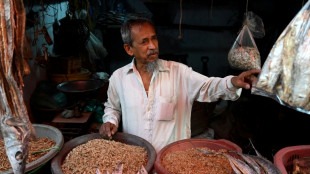
-
 North Korea touts nuclear advances as Kim re-chosen to lead ruling party
North Korea touts nuclear advances as Kim re-chosen to lead ruling party
-
South Korea protests 'Victory' banner hung from Russian embassy


The dribble test: How toddlers spot close social ties
The thought of sharing an ice cream cone with a stranger can trigger feelings of disgust -- however that's often not the case with someone close to us, such as a romantic partner or child.
A new study in the journal Science on Thursday shows that children are aware of this dynamic from a very young age, and see saliva exchange -- through activities like kissing, sharing food, or wiping away dribble -- as a cue to tell whether two people have a special bond.
"We know from a lot of research that infants are super attuned to that social aspect of their world," Ashley Thomas, a researcher at Harvard and MIT, told AFP.
"But one thing that we didn't know before this study is whether they really pay attention to different types of relationships."
In particular, Thomas and colleagues wanted to know whether children can distinguish special relationships referred to as "thick," a term first coined by the philosopher Avishai Margalit.
To test whether children make the same distinctions as adults, the team devised a series of experiments.
First they presented a group of more than 100 children aged five to seven with cartoons featuring characters in interactions with each other.
The children successfully predicted that "sharing utensils, or licking the same food item, would occur within nuclear families, whereas sharing toys and partitionable food would occur equally within friendships and families."
- Puppet show -
Next, the researchers wanted to test the theory on infants and toddlers, who cannot vocalize their thoughts as well as older children.
Their experiment was inspired by classic studies of vervet monkeys, who heard a familiar juvenile in distress and looked toward that juvenile's mother, expecting her to respond.
To recreate the idea for young humans, they made video clips featuring two female research assistants from Thomas's lab play-acting with a cute blue puppet.
The first woman took a bite of an orange slice, then fed the puppet, then took another bite of the same slice.
The second woman is then shown passing a ball back and forth with the puppet.
"Both are really friendly interactions and cooperative, but only one of them might be something that we would associate as adults with a close relationship," said Thomas.
They then showed their dozens of subjects a clip of the same puppet crying, with both women on either side of it, and measured who the babies looked at first and for how long.
The children surmised that the pair in a saliva-sharing relationship were closer.
Both actresses -- who were of different ethnicities -- played in both roles to different groups of economically and racially diverse toddlers.
To make sure the children weren't just assuming a person who shares food is inherently nicer, they ran another test in which the subjects were shown the same opening videos, but the puppet in distress was a new character.
When this happened, neither the infants nor toddlers looked first or longer at the food sharer.
Finally, they ran a test where one actress placed her finger in her mouth, rotated it, then placed it in the puppet's mouth, while the other actress performed the same rotating actions on her and the puppet's forehead.
Once more, the children looked more to the actress sharing saliva when the puppet cried, isolating this as the marker.
- Making connections -
The findings build on scientific understanding about how children grasp social dynamics, said Thomas.
"We know, for example, that infants pay attention to who's nice to someone else," she said.
"The main takeaway of this study is that infants are not only paying attention to people's traits... they're also paying attention to who's connected and how they're connected."
Understanding how we think about human relationships might one day have practical benefits, for example by helping people who find it harder to forge such bonds.
"What a moral failing it's been that we haven't helped autistic people with their connections with other people," said Thomas.
"They really want those connections, and they just might lack some of the skills to create them. I think that this research could help us help other people navigate relationships eventually."
S.Barghouti--SF-PST



